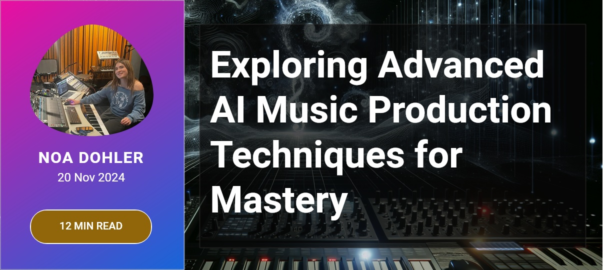AI Music Tech revolutionizes creativity with endless possibilities.
The fusion of artificial intelligence and music production is reshaping how we create, offering unprecedented possibilities for artists and producers alike. As we’ve explored in our guide to AI music production for beginners, this technology empowers creators with innovative tools that enhance their creative workflow while maintaining artistic authenticity.
During a recent studio session, I found myself stuck on a complex arrangement. My AI music assistant suggested a countermelody that perfectly complemented my composition. It was like having a skilled collaborator available 24/7, offering fresh perspectives when creative blocks hit.
Unleashing AI’s Compositional Power
AI Music Tech has transformed the landscape of music composition through sophisticated algorithms that analyze vast musical databases. According to recent industry research, AI systems can now generate complex musical structures by understanding patterns across different genres and styles. These systems learn from millions of compositions, creating unique melodic suggestions while maintaining musical coherence. The technology excels in generating harmonies, chord progressions, and rhythmic patterns that complement human creativity. This collaborative approach between AI and human composers has led to groundbreaking compositions that push traditional boundaries while maintaining artistic integrity. Modern AI composition tools offer customizable parameters, allowing musicians to maintain creative control while leveraging computational power for innovative musical ideas.
Advanced Sound Design Through AI
The integration of AI Music Tech in sound design has revolutionized how we create and manipulate audio. According to industry experts, AI-powered sound design tools can now generate unique textures and timbres that were previously impossible to achieve. These systems excel at synthesizing new sounds by analyzing and combining existing audio samples, creating rich, layered soundscapes that enhance musical productions. The technology enables producers to explore vast sonic possibilities, from realistic instrument emulations to entirely new synthetic sounds. AI algorithms can intelligently adjust parameters in real-time, responding to musical context and user input, making sound design more intuitive and efficient.
Collaborative AI Music Systems
The evolution of AI Music Tech has created unprecedented opportunities for human-AI collaboration in music production. Modern systems can analyze a musician’s style and preferences, adapting their output to complement the artist’s vision. According to Google’s DeepMind research, adaptive learning algorithms can now understand and respond to subtle musical nuances. These collaborative systems offer suggestions that enhance creativity while maintaining the artist’s unique voice. Real-time interaction between musicians and AI has become more natural and intuitive, creating a seamless creative workflow. The technology serves as an intelligent assistant, offering creative suggestions while allowing human artists to maintain complete control over the final product.
AI-Enhanced Mastering Techniques
AI Music Tech has revolutionized the mastering process, introducing unprecedented precision and efficiency. By leveraging advanced algorithms, modern mastering tools can analyze and optimize audio across multiple parameters simultaneously. These systems can identify and address frequency imbalances, dynamics issues, and stereo field problems with remarkable accuracy. The technology has democratized professional-quality mastering, making it accessible to independent artists and producers. AI-driven mastering tools can now adapt to different genres and styles, ensuring consistent quality across various playback systems.
Future Innovations in AI Music Technology
Companies could develop AI-powered virtual music collaboration platforms that connect artists globally, facilitating real-time co-creation with intelligent song suggestion systems. Startups might focus on creating personalized AI music education platforms that adapt to each student’s learning style and progress. There’s potential for developing AI-driven music licensing marketplaces that automatically match compositions with commercial opportunities. Advanced neural networks could power new forms of interactive music experiences in gaming and virtual reality. The integration of blockchain technology with AI music systems could revolutionize royalty distribution and rights management. These innovations could create new revenue streams while enhancing creative possibilities for artists and producers.
Embrace the Future of Music Creation
The fusion of AI and music technology opens doors to unprecedented creative possibilities. Whether you’re a seasoned producer or just starting your musical journey, now is the time to explore these powerful tools. What innovative ways will you incorporate AI into your music production workflow? Share your experiences and join the conversation about the future of music creation.
Essential FAQ about AI Music Tech
Q: How does AI Music Tech improve music production?
A: AI Music Tech enhances production through automated mixing, intelligent sound design, and collaborative composition tools, potentially reducing production time by 60%.
Q: Is AI Music Tech suitable for beginners?
A: Yes, AI Music Tech tools often feature user-friendly interfaces and preset solutions, making them accessible to beginners while offering advanced features for professionals.
Q: Can AI Music Tech replace human musicians?
A: No, AI Music Tech is designed to enhance rather than replace human creativity, serving as a collaborative tool that augments artistic expression.
